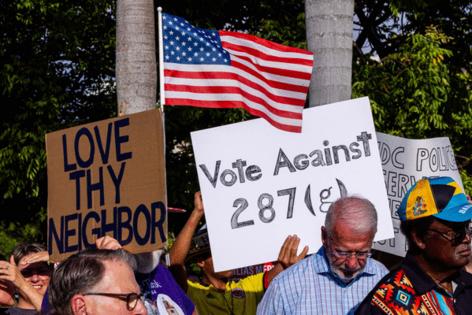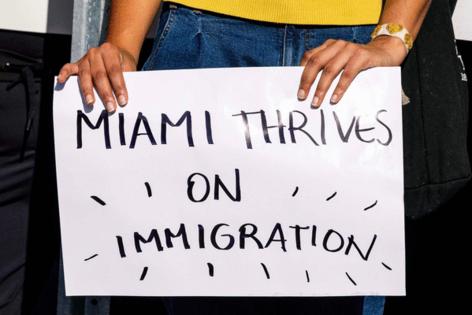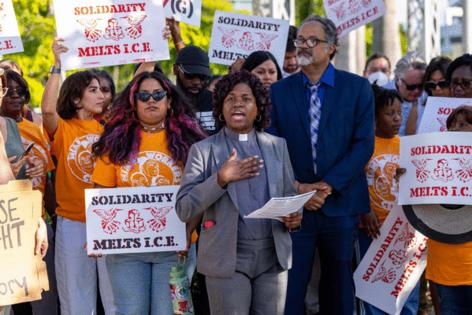In 'city of immigrants,' Miami votes to enter ICE agreement
Published in News & Features
MIAMI — After hours of commentary from residents expressing opposition, city commissioners in Miami have voted in favor of entering an immigration enforcement agreement with ICE, deputizing police officers in South Florida’s largest city with immigration enforcement powers.
At Tuesday’s City Commission meeting, Commissioners Joe Carollo, Miguel Angel Gabela and Ralph Rosado voted for the city to enter into a 287(g) agreement with ICE.
Commissioners Christine King and Damian Pardo voted no. “All of us are immigrants,” King said.
Pardo had proposed indefinitely deferring the vote until there was a resolution reached in a case involving the city of South Miami, which filed a lawsuit in March seeking to determine if local municipalities are required to enroll in the program. Nevertheless, the commission decided to move forward without another delay.
City Attorney George Wysong cautioned the city against voting no, saying “there could be real consequences.”
Local police departments are not explicitly required to join 287(g) agreements, but Gov. Ron DeSantis and Florida Attorney General James Uthmeier have argued that under the state’s sanctuary law, they are mandated to do so.
Uthmeier threatened to punish Fort Myers City Council members earlier this year when they declined to enroll in the program. Still, most Miami-Dade cities, including Miami Beach and Miami Gardens, have yet to join, according to ICE’s database for participating agencies.
The city has voted to enter the “task force” model. Police Chief Manuel Morales said that — for now — just three Miami police officers would be selected and trained to carry out immigration enforcement functions and that they would do so only while under the direct supervision of ICE.
The City Commission vote ran in contrast with the overwhelming opinion of the dozens of members of the public who came to speak at City Hall on Tuesday.
More than 75 people spoke out against the agreement, including some who described Miami as a “city of immigrants.”
Miami resident Marquis Duncan said the city voting to enter a 287(g) agreement would be a “cultural betrayal.”
“What’s truly remarkable, in the most disappointing way, is that this proposal is even up for a vote in a city with a Hispanic mayor and a City Commission where four of the members have Hispanic surnames,” Duncan said.
He added that if the commission decides to enter the agreement, “Don’t pretend that this is still the Magic City. … Strip it bare. No more cafecito windows. Shut down Versailles. Pull the roosters out of Little Havana. Erase the Cuban walk on 13th Street. Tear down the Cuban monuments you just restored. Knock down the Freedom Tower.”
Former Key Biscayne Mayor Mike Davey also spoke against the 287(g) agreement, telling the city to “stand up.”
“We are the municipalities of Miami-Dade County, and we have to stand up when the state tries to oppress us,” Davey said.
Jonathan Homan told the commissioners that if they voted in favor of entering the ICE agreement, “you will all forever be disgraced as traitors.”
“I and many others understand the need to deport violent criminals,” Homan said. “But this policy you are seeking to approve will not protect Americans from violent criminals. It will instead unleash them onto us all in the form of ICE.”
‘Diversity is our superpower’
Before the meeting began Tuesday morning, a group of demonstrators held signs outside of City Hall, urging commissioners to vote no.
“We’ve gathered today to send a clear and urgent message: turning local police into immigration agents under 287(g) agreements is dangerous for Miami,” said Dariel Gomez, a statewide organizer with the ACLU of Florida. “Miami is a city shaped by immigrants. We can see that right here.”
The decision to enter the 287(g) agreement could have major impacts in a city where about 58% of residents are foreign born and over 70% are Hispanic or Latino, according to U.S. Census Bureau data. With just under a half-million people, Miami is the largest city in Miami-Dade County and the second largest in Florida.
“We’re not Los Angeles, we’re not New York, we’re not Dallas. Miami is Miami, a city where Spanish, Creole, English, various faith traditions all coexist on the same block,” said Senior Pastor Sherlain Stevens of the Ebenezer United Methodist Church, adding: “Diversity is our superpower.”
Outside City Hall, Miami resident Natalia Menocal said Tuesday morning that she didn’t want community members “ to fear making a quick trip to Publix or enjoying a day at the beach because they look or sound like an immigrant or are not carrying the proper paperwork.”
“287(g) would make it dangerous for anyone in Miami who ‘looks like an immigrant’ or has an accent to walk around without their papers,” Menocal said.“ ... That’s not the side of history we want to be on.”
_____
©2025 Miami Herald. Visit at miamiherald.com. Distributed by Tribune Content Agency, LLC.












Comments